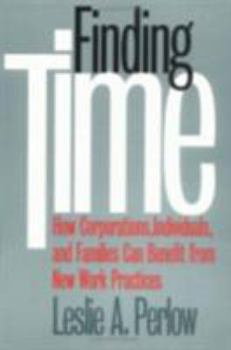Finding Time: Chivalric Ideas and Practices in Medieval France
Select Format
Select Condition 
Book Overview
Why do Americans work so hard? Are the long hours spent at work really necessary to increase organizational productivity? Leslie A. Perlow documents the worklife of employees who assume that for their own success and the success of their organization they must put in extended hours on the job. Perlow doesn't buy it. She challenges the basic assumption that the more employees work, the better the corporation will do.For nine months, Perlow studied...
Format:Paperback
Language:English
ISBN:0801484456
ISBN13:9780801484452
Release Date:November 1997
Publisher:ILR Press
Length:176 Pages
Weight:0.55 lbs.
Dimensions:0.5" x 5.7" x 9.1"
Age Range:18 years and up
Grade Range:Postsecondary and higher
Customer Reviews
3 ratings
So true, its almost scary.
Published by Thriftbooks.com User , 18 years ago
I work for a Tech company in Silicon Valley. It's been about 10 years since this book was written and it's amazing to me how little has changed since then. The work culture in Silicon Valley corporations mirrors that of "Ditto" corporation. People feel obligated to work long hours while sacrificing their personal lives. To me, reading this book has been an eye-opening experience. I am now aware of the havoc that the work/life balance equation can unleash on people's lives. I see shades of the characters covered in the book in my colleagues and friends. Awareness of these issues is the first step in defining your personal values at work. Good job, Leslie!
Practical Techniques of Time Management
Published by Thriftbooks.com User , 21 years ago
Time Management skills are essential for successful people the book deals with practical techniques, which have helped the leading people in business reach the pinnacles of their careers. The skills explained in the book helps you to become reliable and effective and show you how to identify and focus on the activities that give you the greatest returns by explaining goal setting, which is a vitally important skill for achieving what you want to achieve with your life. It is neatly summed up in the Pareto Principle, or the "80:20 Rule". This argues that typically 80% of unfocussed effort generates only 20% of results. The remaining 80% of results are achieved with only 20% of the effort. While the ratio is not always 80:20, this broad pattern of a small proportion of activity generating non-scalar returns recurs so frequently as to be the norm in many areas. It also talks about issues like learn to say no, learn to prioritize, combine several activities, doing subordinate's work, doing the work of others, scheduling projects, monitoring staff, and setting long-term objectives. The absence of personal time management is characterized by last minute rushes to meet deadlines, days, which seem somehow to slip unproductively by, crises, which loom unexpected from nowhere. This sort of environment leads to inordinate stress and degradation of performance. Poor time management is often a symptom of over confidence: techniques, which used to work with small projects and workloads, are simply reused with large ones. However, inefficiencies, which were insignificant in the small role, are ludicrous in the large. You cannot drive a motor bike like a bicycle, nor can you manage a supermarket-chain like a market stall. The demands, the problems, and the payoffs for increased efficiency are all larger as your responsibility grows; you must learn to apply proper techniques, or be bettered by those who do. Possibly, the reason Time Management is poorly practiced is that it so seldom forms a measured part of appraisal and performance review; what many fail to foresee, however, is how intimately it is connected to aspects, which do. Leslie Parlow's, excellent practical application of Time Management.By Vivek Dixit, Stanford.edu.
Contains Constructive Ideas for Work Process Improvement
Published by Thriftbooks.com User , 24 years ago
While this book explores work-family issues, it also gives concrete suggestions about how to improve management processes and allow workers more personal time without decreasing productivity. Essentially, the thesis of the book is that workers that can work uninterrupted for a significant period each day are more productive and efficient. This thesis is supported by a study done by the author at a Fortune 500 company named "Ditto" (probably Xerox in real life).However, a depressing aspect of the book is that once higher productivity is achieved, Ditto Corp just piles on more work! Anyone who has worked in a high-stress, tight-deadline environment will be able to identify with the situations in this book.In terms of action orientation, I found this book better than "Time Bind" by Arlie Hochschild. It also leaves out the liberal politics. Give it as an anonymous gift to the the CEO of your company!






